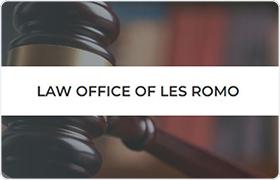Williamson County, TX Real Estate Lawyers
Sponsored Law Firm
-
 x
x

Click For More Info:
-
Law Office of Les Romo
102 West Morrow Street Suite 202 Georgetown, TX 78627» view mapEstate Law Helping You Understand Your Options
Attorney Les Romo can help protect your interests and resolve your legal issue in the best possible way. Attorney Romo is dedicated to vigorously representing his clients.
800-769-7481
Les David Romo
✓ VERIFIEDWills & Probate, Business, Lawsuit & Dispute, Real Estate, Litigation
Attorney Les Romo graduated from Southwestern University here in Georgetown and went on to earn his Doctorate of Jurisprudence at St. Mary’s Univers... (more)
Elizabeth Audrey Mcfarland
International Tax, Trusts, Commercial Real Estate, Estate Planning
Status: In Good Standing Licensed: 13 Years
William Todd Ver Weire
Construction, Natural Resources, DUI-DWI, Criminal, Business
Status: In Good Standing Licensed: 32 Years
Joe Lawrence Fulwiler
Construction, Litigation, Family Law, Business & Trade
Status: In Good Standing Licensed: 30 Years
Mary Kristine Taylor Warren
Commercial Real Estate, Wills, Business & Trade, Business
Status: In Good Standing Licensed: 24 Years
Ferris F. Akins
Power of Attorney, Commercial Real Estate, Wills, Divorce & Family Law
Status: In Good Standing Licensed: 46 Years
Christopher Stanley
Construction, Litigation, Insurance, Credit & Debt
Status: In Good Standing Licensed: 36 Years
Wesley P. Prewitt
Commercial Real Estate, Wills, Estate, Business & Trade
Status: In Good Standing Licensed: 26 Years
Wendi Rebekah Lester
Commercial Real Estate, Wills, Family Law, Personal Injury
Status: In Good Standing
 Les Romo Georgetown, TX
Les Romo Georgetown, TX Practice AreasExpertise
Practice AreasExpertise

